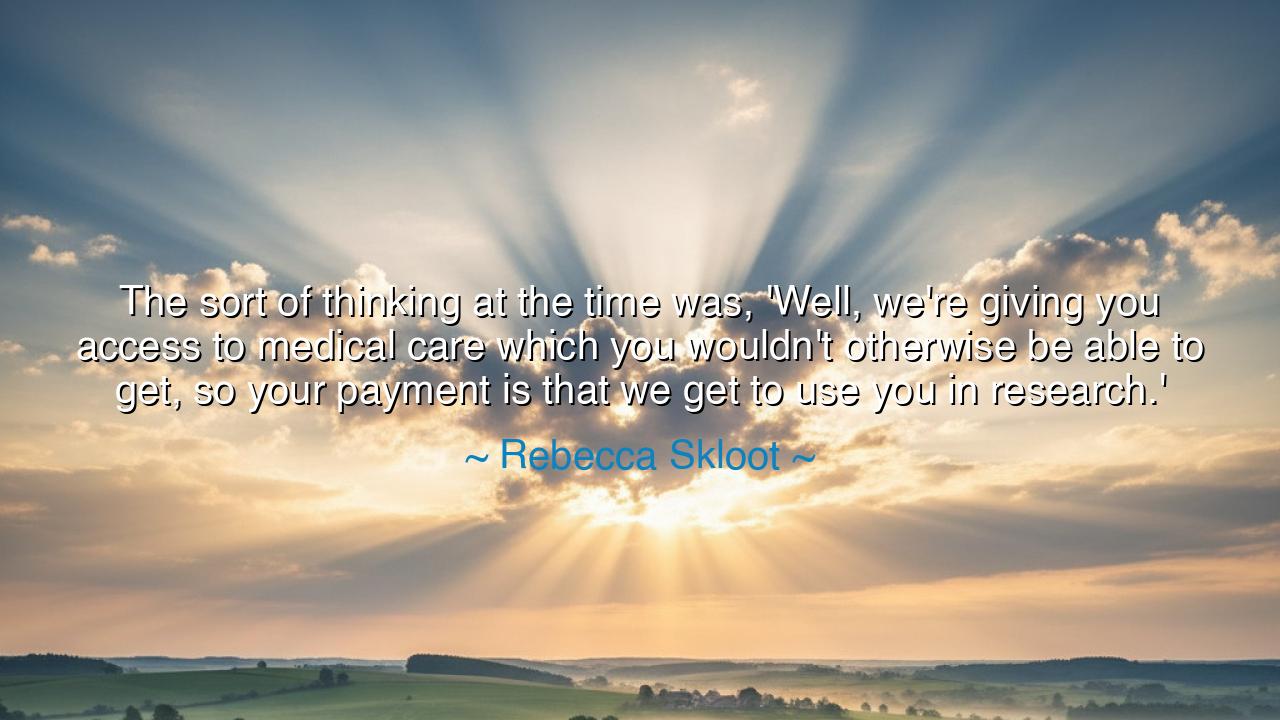
The sort of thinking at the time was, 'Well, we're giving you
The sort of thinking at the time was, 'Well, we're giving you access to medical care which you wouldn't otherwise be able to get, so your payment is that we get to use you in research.'






In the words of Rebecca Skloot, writer, seeker of truth, and guardian of memory, there is a quiet indictment that pierces the heart of history: “The sort of thinking at the time was, ‘Well, we’re giving you access to medical care which you wouldn’t otherwise be able to get, so your payment is that we get to use you in research.’” Beneath these words lies the story of exploitation veiled as generosity — a tale as old as human ambition, where the powerful cloak their hunger for progress in the language of benevolence. Skloot speaks not merely of science, but of ethics, of the sacred balance between knowledge and compassion, between discovery and dignity.
The origin of this quote arises from Skloot’s work chronicling the life and legacy of Henrietta Lacks, the poor Black woman whose cells — taken without her consent in 1951 — became one of the most important tools in modern medicine. Her immortal “HeLa” cells led to countless scientific breakthroughs: the polio vaccine, cancer research, gene mapping, and more. Yet Henrietta herself died in pain and poverty, never knowing what had been done with her body, and her family lived for decades in ignorance and hardship, while institutions and industries prospered from her gift. Skloot, through her book The Immortal Life of Henrietta Lacks, brought this buried truth to light — and through this quote, she reveals the cold rationalization that allowed such injustices to flourish.
In her words, we glimpse the justifications of an age when medical ethics bowed before the altar of progress. The thinking was clear, yet cruel: that those who were poor, marginalized, or desperate should be grateful for whatever care they received — even if it came at the price of their autonomy, their privacy, and their humanity. It was a trade made not between equals, but between those with power and those without. The doctor stood as a god; the patient, a vessel. The act of healing, once sacred, became a transaction. Skloot’s voice carries the weight of history’s shame, but also the spark of redemption — the belief that by remembering, by naming, by bearing witness, humanity may yet rise above its past.
This pattern is not confined to Henrietta Lacks alone. The Tuskegee Syphilis Study, conducted in the United States between 1932 and 1972, followed hundreds of Black men who were deceived into believing they were receiving medical treatment for syphilis. In truth, the doctors withheld treatment, watching the disease destroy lives so that they could study its course. The men, trusting in medicine, were betrayed by it. Their “payment” was their suffering; their “consent” was forged through ignorance. These were not isolated acts, but reflections of an era when the poor and the voiceless were seen as instruments rather than individuals — as means to knowledge, not ends in themselves.
And yet, Skloot’s words also hold a mirror to us today. She reminds us that even in modern times, the temptation of such thinking endures — to believe that the ends justify the means, that progress excuses exploitation. In every field of innovation — from genetics to artificial intelligence — the same question echoes: At what cost do we advance? The wisdom of her reflection lies not in condemnation alone, but in awakening — awakening the conscience of those who would create, to remember that every discovery touches a life, every experiment begins with a human story.
Her quote is not a curse upon science, but a call to conscience. Science, after all, is not the villain — it is the hands that wield it without empathy that corrupt it. To seek knowledge is noble; to take it without respect is sin. In every age, the wise must remind the ambitious that progress without ethics is regression in disguise. The doctor, the researcher, the innovator — all must walk with humility, knowing that every subject, every patient, every life is sacred. True advancement is not measured by what we learn, but by how human we remain while learning it.
So, my children, remember this lesson from Rebecca Skloot and from Henrietta Lacks, whose body gave life to generations she never saw: never allow gratitude to be used as a chain, nor progress to be built upon the suffering of the unseen. Let your compassion guide your curiosity, and let your respect for human dignity temper your hunger for discovery. When you stand before knowledge, remember the faces behind it — for every triumph of science carries the memory of those who made it possible, willingly or not.
And when you labor in your own craft, whether as healer, creator, or thinker, hold this truth close to your heart: to care for the vulnerable is the highest form of wisdom. Let no one’s pain become another’s profit, and let the light of understanding never be purchased with the darkness of another soul. For only when knowledge walks hand in hand with mercy will humanity truly advance — and only then will we have honored the oath we owe to each other: to seek truth, but never at the cost of compassion.






AAdministratorAdministrator
Welcome, honored guests. Please leave a comment, we will respond soon